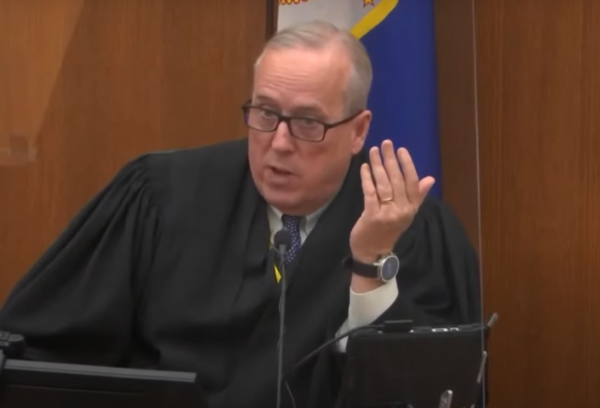The Hennepin County judge who presided over the Derek Chauvin trial ruled on Tuesday, May 11, that he will consider aggravating factors in the sentencing of the former officer, which could result in more prison time.
Judge Peter Cahill said in a court document filed on Tuesday that multiple facts supporting an aggravated durational departure have been proven beyond a reasonable doubt.
In April, a jury found Chauvin guilty of second-degree murder, third-degree murder and manslaughter in the May 2020 death of George Floyd, who died after Chauvin knelt on his neck for more than nine minutes.

While awaiting sentencing, 45-year-old Chauvin is being held in solitary confinement for 23 hours a day at the Minnesota Correctional Facility. He faces a maximum of 40 years in prison.
Several aggravating factors that could allow Cahill to go beyond normal sentencing guidelines are named in the ruling. Cahill said the prosecution proved beyond reasonable doubt that Chauvin abused a position of trust and authority, and that he treated Floyd with “particular cruelty.” Chauvin’s attorney Eric Nelson had argued that there were no aggravating factors.

In addition, Cahill wrote that several children, including three 17-year-olds and one nine-year-old, were present during the incident.
“Although these four children did not observe all the events, they did observe a substantial portion of the Defendant’s use of force and witnessed the last moments of Mr. Floyd’s life,” he wrote.
Darnella Frazier, who was 17 at the time of the incident, was awarded the PEN America award for courage in 2020 after footage she took of Floyd’s death was shared across the globe.
Cahill also named the fact that Chauvin carried out the crime for which he was convicted as a part of a group with at least three other people. The judge wrote that officers J. Alexander Kueng and Thomas Lane were involved in the restraint that resulted in Floyd’s death. In addition, officer Tou Thao kept bystanders away from Floyd and allowed the other officers to continue using unreasonable force.
The trio has been charged with aiding and abetting second-degree murder, and aiding and abetting second-degree manslaughter. Their trial has been delayed to March 7, 2022.
Cahill did not determine that Floyd was particularly vulnerable, saying drug intoxication had not rendered him so, and explaining that Floyd being placed in the prone position did not create vulnerability, but was instead the very mechanism of his death.

Ben Crump and other attorneys representing Floyd’s family said the ruling “offers hope that we will see real change in the relationship between police and people of color by holding officers properly accountable for egregious behavior and for failing to honor the sanctity of all lives.”
While the aggravating factors allow Cahill to go outside of sentencing guidelines, they do not indicate that he will do so.
Chauvin’s sentencing is scheduled for June 25. The former officer waived his right to have the jury determine the sentence, and Cahill will make the decision If Cahill stays within the sentencing guidelines for the most serious second-degree murder charge, he could sentence Chauvin for as little as 10 years and eight months or as many as 15 years in prison. The second-degree murder charge has a maximum penalty of 40 years.
Minnesota Attorney General Keith Ellison, who assembled a team of prosecutors for the case, indicated he supports Cahill’s acknowledgment of aggravating factors.
“We appreciate the court agreed with our assessment of the aggravating factors,” he told KSTP. “The particular cruelty of Derek Chauvin’s conduct, his abuse of authority with his fellow officers and the impact of this crime on the minors who had to witness it require a sentence that holds Mr. Chauvin sufficiently accountable.”
Chauvin has also been indicted on federal charges, alleging he violated Floyd’s civil rights. If convicted, he could serve the federal sentence at the same time as the state sentence.


